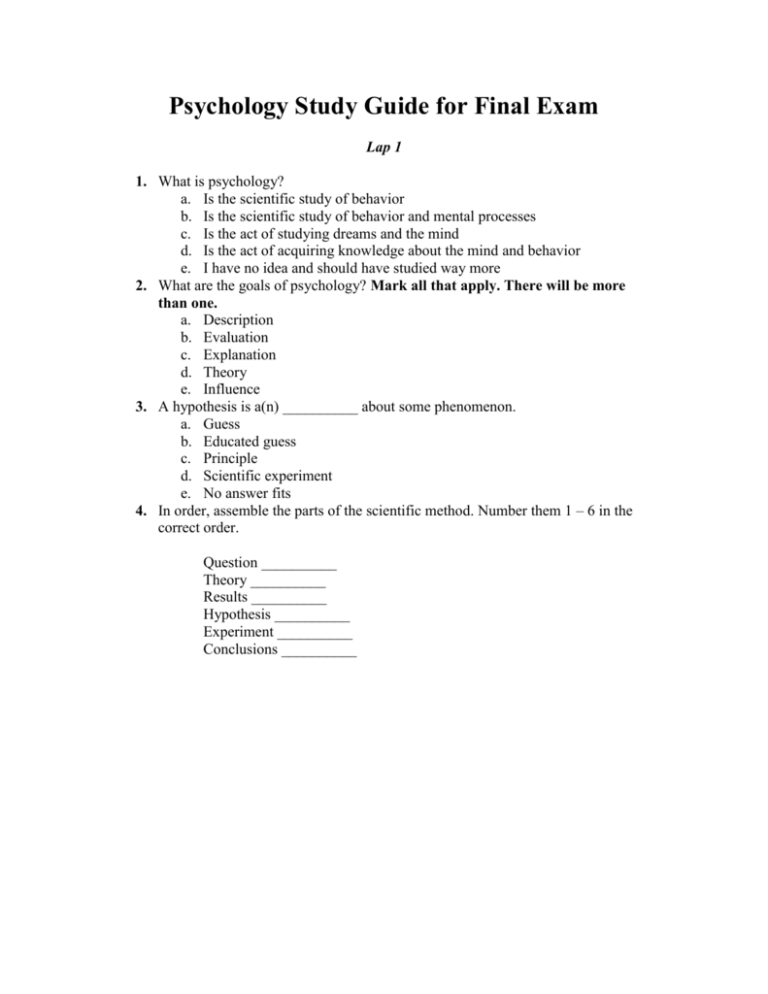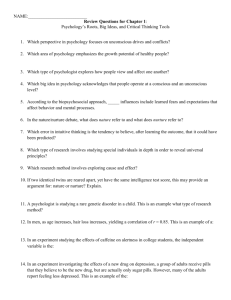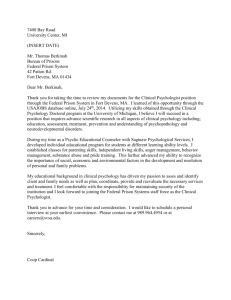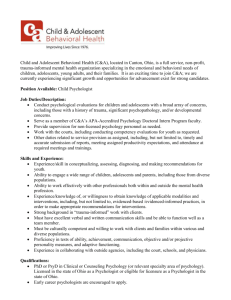Final Exam Review
advertisement

Psychology Study Guide for Final Exam Lap 1 1. What is psychology? a. Is the scientific study of behavior b. Is the scientific study of behavior and mental processes c. Is the act of studying dreams and the mind d. Is the act of acquiring knowledge about the mind and behavior e. I have no idea and should have studied way more 2. What are the goals of psychology? Mark all that apply. There will be more than one. a. Description b. Evaluation c. Explanation d. Theory e. Influence 3. A hypothesis is a(n) __________ about some phenomenon. a. Guess b. Educated guess c. Principle d. Scientific experiment e. No answer fits 4. In order, assemble the parts of the scientific method. Number them 1 – 6 in the correct order. Question __________ Theory __________ Results __________ Hypothesis __________ Experiment __________ Conclusions __________ Match each item in Column A with the items in Column B. Write the correct letters in the blanks. Column A Column B _____ 5. A psychologist who studies the A. Behaviorist basic elements of conscious mental experiences B. Functionalist _____ 6. A psychologist who analyzes observable behavior and studies C. Structuralist conditioning and reinforcement _____ 7. A psychologist who studies how D. Psychobiologist unconscious motives and conflicts determine human behavior E. Psychoanalyst _____ 8. A psychologist who studies how mental processes help people and animals adapt to their environment _____ 9. A psychologist who studies the effects that physical and chemical changes have on behavior 10. The first modern psychologist who was primarily interested in understanding the unconscious mind was a. Wilhelm Wundt b. Sir Francis Galton c. Sigmund Freud d. Ivan Pavlov e. No idea 11. The branch of psychology that emphasizes that perception is more than the sum of its parts is a. Functional psychology b. Gestalt psychology c. Behavioral psychology d. Perceptual psychology e. I am so lost…and scared 12. The picture is an example of what type of psychology a. Behaviorist b. Gestalt c. Psychoanalyst d. Functionalist e. Structuralist 13. Would a Structuralist and a Functionalist get along if they were left alone in a room to discuss psychology related topics? a. Yes, they would get along! b. No, they would not get along at all! Matching Match each item in Column A with the items in Column B. Write the correct letters in the blanks. Column A Column B _____ 14. Situation in which the A. Single-blind experiment researcher’s expectations influence the researcher’s own behavior, and thereby B. Double-blind experiment influence the participant’s behavior. _____ 15. Experiment in which neither C. Control group the experimenter nor the participants know which participants received which D. Placebo effect treatment _____ 16. Experiment in which only the E. Self-fulfilling prophecy participants are unaware of which participants received treatment _____ 17. Receives a placebo during an experiment to test a new drug _____ 18. Change in participant’s illness that results from a belief that the treatment will have an effect 19. In an experiment a researcher’s _________ may produce non-representative results. a. Expectations b. Behavioral cues c. Techniques d. All of the above e. I am so lost it isn’t even funny 20. The results of the Milgram experiment implies that individuals could easily inflict pain on others if such orders were issued by a a. Trusted friend b. Volunteer researcher c. Respected authority d. None of the above fit e. Probs gonna cry soon f. I hope this isn’t my grade 21. The image below is more closely tied to what approach to psychology? a. b. c. d. e. Psychoanalyst Cognitive Behaviorist Gestalt Functionalist How do you know this? In the blank at the left of each description, write the letter of the term that matches the description. Not all terms will be used. A. B. C. D. E. F. G. H. I. J. Hypothesis Experimental group Case study Independent variable Placebo effect Experiment Self – Fulfilling Prophecy Standard Deviation Sample Control Group 22. _____ A situation on which the experimenter’s expectations influence the participant’s behavior. 23. _____ The portion of the sample to which an independent variable is applied. 24. _____ In testing a cause – and – effect relationship, it is manipulated or controlled by the researcher. 25. _____ A change in the participant’s behavior that does not result from the actual treatment but from the perceived benefit of that treatment. 26. _____ The portion of the sample to which the independence variable is not applied. 27. _____ An educated guess about the relationship between variables. Lap 2 1. What is stress? 2. What in your life stresses you out? Why? How could you go about fixing it? 3. Stress has many components. Explain to me what the below three are. Stressor Negative stress Positive stress 4. What are hassles and uplifts? 5. What is normal? Abnormal? Lap 3 1. Define to the best of your ability what Classical Conditioning is. 2. Define to the best of your ability what Operant Conditioning is. 3. Explain in a sentence or two what the similarities and differences are between Classical and Operant Conditioning. 4. How are memories stored? Remember there are three steps. Be sure and explain what these three steps are. 5. Explain what short – term memory is. 6. Explain what long – term memory is. 7. How do you store memories in your long term memory? Think about the example we used when we discussed memories when you were younger. 8. How do you learn best: Visual, Auditory, or Kinesthetic? 9. How do you know? Please be as specific as possible. Lap 4 1. Review ALL quizzes on the Weebly site for Lap 4. 2. Be able to describe the relationship between the: a. Id b. Ego c. Superego 3. Be able to define the following defense mechanisms: a. Rationalization b. Repression c. Denial d. Projection e. Reaction formation f. Regression g. Displacement h. Sublimation 4. What does reinforcement have to do with behavior? 5. Maslow’s hierarchy of needs.





